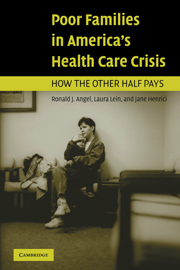Book contents
- Frontmatter
- Contents
- Preface
- Poor Families in America's Health Care Crisis
- 1 The Unrealized Hope of Welfare Reform: Implications for Health Care
- 2 The Health Care Welfare State in America
- 3 The Tattered Health Care Safety Net for Poor Americans
- 4 State Differences in Health Care Policies and Coverage
- 5 Work and Health Insurance: A Tenuous Tie for the Working Poor
- 6 Confronting the System: Minority Group Identity and Powerlessness
- 7 The Nonexistent Safety Net for Parents
- 8 Health Care for All Americans
- References
- Index
1 - The Unrealized Hope of Welfare Reform: Implications for Health Care
Published online by Cambridge University Press: 25 July 2009
- Frontmatter
- Contents
- Preface
- Poor Families in America's Health Care Crisis
- 1 The Unrealized Hope of Welfare Reform: Implications for Health Care
- 2 The Health Care Welfare State in America
- 3 The Tattered Health Care Safety Net for Poor Americans
- 4 State Differences in Health Care Policies and Coverage
- 5 Work and Health Insurance: A Tenuous Tie for the Working Poor
- 6 Confronting the System: Minority Group Identity and Powerlessness
- 7 The Nonexistent Safety Net for Parents
- 8 Health Care for All Americans
- References
- Index
Summary
Cecilia, a young biracial (African American and Hispanic) mother of two, identified herself as African American. She was introduced to us by another of our San Antonio respondents. We conducted a number of interviews with her over the course of a year and a half, during which her second child, a daughter named Annika, was born. When we met Cecilia, she was living with Annika's father. Her older child, a two-year-old boy named Kevin, was from a previous relationship. Cecilia's own childhood had been chaotic. Her father had thirteen children with various women, but Cecilia only knew two of her siblings and was not particularly close to either of them. One lived in another state and although Cecilia had talked to her on the phone, they had never met in person. Cecilia lived near her mother, but they were not close and Cecilia received little help from her. She described her mother as “remote” and unwilling to provide child care or other assistance to the family.
Cecilia's grandmother also lived nearby, and Cecilia's relationship with her was much warmer than her relationship with her mother. Her grandmother provided what support she could, and Cecilia greatly appreciated the help. When we met Cecilia, she was estranged from Kevin's father and would not allow him to have any contact with the boy. She felt that the father no longer had any right to see his son because he had stopped paying child support.
- Type
- Chapter
- Information
- Poor Families in America's Health Care Crisis , pp. 1 - 32Publisher: Cambridge University PressPrint publication year: 2006



